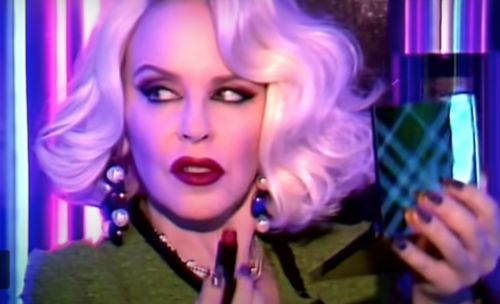Kylie Minogue might be trying her best to resuscitate the decided artistic flop that was Disco (tailored to an older gay gentleman imagining himself to live at Xanadu) with a reissue of the album called Disco: Guest List Edition, but it seems to be, well, not working. Not for those who aren’t easily duped anyway. While others have successfully beat the dead horse of the genre in the twenty-first century, including Madonna with Confessions on a Dance Floor and, even more recently, Dua Lipa with Future Nostalgia, Minogue does little to actually refresh the tired sound of a decade. Even though she did invoke Lipa for a remix of “Real Groove,” little could be done to amend an already generic track. Certainly, that seems to be the main issue with Disco: a lack of Minogue’s own “personal stamp” on things, instead preferring to try to emulate her childhood hero, Olivia Newton-John, whom she once said she “wanted to be.”
With the plastic surgery that makes many famous faces look so similar, she almost does look like Newton-John in a “blink and you’ll miss it” sort of way on the album cover, but can’t quite achieve what Newton-John did in the era when disco was still king (or queen, depending on who you ask). ABBA, too, was another great influence on Minogue, and it seems appropriate that they should be releasing their own studio album, Voyage (their first original release since 1982), the same month as Minogue’s reissue. Apparently, disco just won’t die—as much as the “rockers” of the early 80s believed it would (see: Freaks and Geeks). As the single-most “rejuvenated” musical genre (apart from 60s-era stylings re-popularized by the likes of Amy Winehouse and Lana Del Rey), Minogue is merely part of a trend that every pop artist has tried to “make work” for themselves.
Even musicians who were actually around in the 70s and never really partook of disco are cashing in au présent. Like Elton John revamping his own music into the disco-fied “Cold Heart” featuring, who else, Dua Lipa. Remixed by PNAU, interpolations of “My Sacrifice,” “Rocket Man,” “Kiss the Bride” and “Where’s the Shoorah?” count on making everything that is old new again (sort of like the premise in Last Night in Soho). But there’s nothing fresh about what Minogue is doing. Not satisfied to simply move on and forget about her own disco “era” of 2020, Minogue has revived the record with features from the likes of Years & Years, Gloria Gaynor—the Queen of Disco herself (because really, what else is she doing right now?)—and, of course, Jessie Ware. Being that Ware was capable of carrying off the disco infusion of 2020’s hit album, What’s Your Pleasure?, it’s only natural that Minogue should enlist her help as well for reviving the tired tracks of Disco. Except the duo has come up with an entirely new one in the form of “Kiss of Life,” complete with a video that smacks of Madonna’s “Deeper and Deeper” aesthetic and a sound that is an almost direct ripoff of A Taste of Honey’s “Boogie Oogie Oogie.”
Taking place in an “Italian” restaurant (complete with a sign that says “Bagni”), the video opens on Ware—already famed for her love of food—in the kitchen making what appears to be a very nasty plate of pasta that caters to British and American stereotypes of what Italian food is supposed to look like. Minogue, meanwhile, flounces in wearing an oversized red hat (with bombastic feather flourishes). Assorted “camp” figures populate the restaurant as Minogue takes a seat at her table, looking like Madonna’s 90s-era imitation of a middle-aged Jewish woman (her then publicist, Liz Rosenberg) on SNL’s “Coffee Talk.”
As Minogue demands, “Give me the kiss of life,” Ware takes a microphone that appears seemingly out of nowhere to engage in a little impromptu karaoke show for the restaurant. Around the one-minute, fifty-three second mark, the video takes a more surrealist turn as Minogue and Ware sit across from each other at a table and Minogue sprouts an extra hand with a mind of its own. For arbitrary weirdness, Ware pulls on Minogue’s hand, only for it to come right out of its sleeve as though it belonged to a mannequin. More singing on the karaoke microphone and eating of bowls of pasta ensues.
In the end, we realize Minogue fancies herself some kind of food critic/analog Yelper as she leaves a “glowing” review of Ware’s joint on her magically-appearing typewriter (like Jay-Z in the “About Love” campaign, she seems to have been inspired by Madame X with this currently anachronistic accoutrement). A “review” that turns out to mimic, in its own way, the insanity of the line, “All work and no play makes Jack a dull boy” when presented in The Shining. Just another manner in which Minogue has no issue with being endlessly derivative during this particular musical and visual era.



















